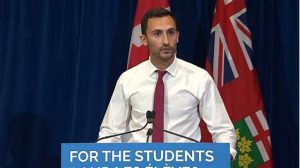Stephen Lecce scraps hiring rules and wins Snobelen Award
The right time for big changes?
What is Stephen Lecce up to? Last Thursday, he announced that Regulation 274 highlighting seniority as an integral part of teacher hiring, would be scrapped. School boards across the province, according to his memorandum, will have until December 31, to come up with new hiring policies that “will need to be consistent with a forthcoming Policy/Memorandum (PPM) and responsive to the local context.”
Apparently, Mr. Lecce has been living for the past few months on a rock orbiting Mars. He doesn’t appear to have noticed that there is a COVID-19 pandemic made worse for students by the ham-handed way his government has prepared for them  to return to school. So, maybe he’s equally in the dark about the possibility that school boards across the province have something better to do than establish new hiring policies that conform to a policy memorandum he hasn’t yet written.
to return to school. So, maybe he’s equally in the dark about the possibility that school boards across the province have something better to do than establish new hiring policies that conform to a policy memorandum he hasn’t yet written.
Or maybe Mr. Lecce attended the John Snobelen school of education management and just knows a useful crisis when he sees one? What better time to ratchet back the concept of seniority than when everyone is trying to cope with the problems he created by underfunding schools. Here’s a checklist he might have followed:
-
-
-
- Boards are having a lot of trouble coping with the fact that parents are changing their kids from in-school to online learning- trying to hire teachers to fit both very fluid situations. – check
- They have that problem because the Ford government hasn’t funded in-class learning to cover 15 students per teacher. – check
- Time to claim, without any support, that the reason boards are having trouble hiring teachers is because of Regulation 274 – check
- Get rid of Regulation 274 – check
-
-
Getting rid of the Regulation
Scrapping the regulation has been on Mr. Lecce’s “to-do” list since negotiations with the Ontario teachers began over a year ago. In effect, it’s a form of contract stripping. Elementary Teacher Federation of Ontario (ETFO) president Sam Hammond told School that not all local agreements from the latest round of collective bargaining have been concluded – so the language and practice of the existing Regulation should still hold true – not be stripped away. ETFO is looking at its legal options to respond to this development.
Regulation 274 came out of contract negotiations in 2012 after years of complaints over nepotism in school boards where teachers known to a principal or other board administrator could be hired for full-time job ahead of those who might have spent years on occasional teaching lists waiting for an interview. It was a way to put some rules into the game. From the beginning, it rankled the Ontario Public School Board Association (OPSBA) whose members claimed they weren’t consulted about the Regulation.
As a champion for OPSBA, Mr. Lecce is very good at misdirection; you’d think teacher hiring has been operated entirely by teachers unions prior to October 15. As he told CP24: “In 2012 the former Liberals (sic) brought in the regulation that requires hiring to be based on union seniority, not to be based on qualification on merit on their diversity or on the mobility of a young educator that really wants to get into our classrooms.”
This is so perversely incorrect that it’s a wonder the Minister’s pants didn’t spontaneously ignite. First of all, to get a permanent job with a school board, a teacher needs to be on a list of occasional teachers who have shown they can handle long-term assignments. These teachers are called long-term occasional teachers (LTO). Teachers on that list may get an interview for a posted full-time job if they are one of 5 people who have:
(a) have the required qualifications for the position;
(b) have the highest ranking under section 2; and
(c) have agreed to be interviewed. O. Reg. 274/12, s. 6 (3).
Note: (b) refers to seniority
There is nothing in the regulation that stops school boards from hiring teachers to their occasional teachers’ lists without considering a candidate’s merit, background or desire to teach. They have to be qualified teachers. It’s up to the local school boards to consider whether they merit getting on the occasional teacher list.
Problems that could be solved
It’s true, that there are problems from both the union and school board perspectives about the regulation. A detailed report produced by Directions Evidence and Policy Research Group in 2014 presented a variety of key observations regarding Regulation 274. Here are some of them:
- There was no provision of support for implementation
- School boards were not happy about losing their autonomy to determine their hiring practices
- There was general acknowledgement that fairness and transparency in hiring were desirable
- Many (maybe most) boards have not previously seen an orderly path to permanent teaching through occasional teaching
- There were no instances that the Regulation’s application resulted in a teacher being employed in a position for which he/she was not qualified
- Some boards were reluctant to share information with the unions and some union locals tended to interpret the Regulation too literally
Both school boards and unions saw some benefits to the Regulation including:
- Teachers being interviewed and hired who might have been passed over before
- Principals finding more good teachers on the occasional teachers lists
- More opportunities for experienced teaches to be hired
- Improvement in boards’ human resources and hiring practices
- Better feedback to teachers
- Better teachers
Both school boards and unions described drawbacks to the Regulation including:
- Lack of mobility for experienced teachers wanting to switch boards
- A big hit to morale for teacher candidates who didn’t get hired for the long-term occasional teacher list – putting them in a position to get a permanent job
- Conflicting interpretations of the Regulation which led to grievances

- The amount of time to meet and monitor the rules under the Regulation
School boards also complained about issues like:
- Principals and vice-principals having no path to return to teaching
- Inability to remove a teacher from the long-term occasional list
- Not being able to select the best candidate
Unions also complained about issues like:
- Small, long-term occasional teacher lists thought to be an attempt by school boards to sabotage the Regulation’s purpose
- A possible bias on the part of school boards for younger applicants
- Difficulty, especially for occasional teachers with seniority, to make the next step towards a full-time job by getting on the long-term occasional list and then staying there if they get a negative evaluation
There were other concerns highlighted by this report and it’s clear that there needed to be some changes. But there were also significant areas of agreement on the part of both unions and school boards. So, there was certainly plenty of room to work things out. Why not fix the Regulation? ETFO President Sam Hammond said that his union worked locally to try improve some of the problems and would willingly work with the school boards and the province to discuss other changes.
The diversity issue
Much has been made of how Regulation 274 has made it impossible for boards to hire from a diverse pool of teachers. That Stephen Lecce referred to “diversity” in his comment above is a bit rich since it was his government that cancelled the consultations with Indigenous groups about curriculum. But Cathy Abraham of the Ontario Public School Board Association (OPSBA) also referred to challenges to school boards like “an inability to address diversity and equity in hiring” when she wrote in support of the Minister’s action. In a recent editorial, the Toronto Star swallowed the Minister’s line, saying: “The least the education system can do is make it easier to hire qualified educators who reflect the diversity of our communities and understand the experiences of the students they’ll be teaching.”

Yet, in the 2014 report from Directions Evidence and Policy Research Group, the authors said that “Ensuring appropriate diversity requires a desire to have a diverse group of teachers on the part of the employer, knowledge of the ethnicity of the existing employee pool (teachers and occasional teachers) and processes which give teachers from minority backgrounds a fair and reasonable chance of employment.” They added that Regulation 274 was in line with an agreement made with the Ontario Human Rights Commission “… to promote, advertise and recruit teachers from racialized communities, persons with disabilities and other under-represented groups.”
As Liz Stuart, President of Ontario English Catholic Teachers (OECTA) wrote this week: “Catholic teachers are committed to ensuring our schools are reflective of our communities, but there is no evidence that Regulation 274 is an impediment to increasing diversity in the teaching profession.”
What this is really about
What’s really the problem here? Lacking any real reasons for scrapping Regulation 274, I think the Ford government wants to challenge “seniority” as an element of hiring. As Tim Heffernan wrote the other day in the Socialist Alternative “In the 2012 contract negotiations between government and unions, the former agreed to Regulation 274 which essentially conceded the union position on seniority.” This is something that has no place in the Tories’ playbook. They want to reduce the number of teachers in the province, not make hiring clearer. After all, they tried to cut back on teachers by increasing class sizes across the province – but had to pull back a bit after the last year’s round of strikes. They tried to cut back on teachers by introducing 4 mandatory online courses – but had to pull back a bit after the last year’s round of strikes. They will keep trying.
If the Tories can get rid of seniority for hiring, they can open that door for teachers with permanent jobs. Less experienced teachers are cheaper to hire and are stuck low on the pay scale. Without seniority rules, a cash-strapped school board could find ways to get rid of more expensive, experienced teachers. No matter what thin platitudes it might use to justify its actions, this is a government that has planned from the time it stomped into Queen’s Park, to cut education spending.
Less experienced teachers are more vulnerable too, as this timely editorial from 2000 in the New Democracy Newsletter points out:
“Who is “the best person for the job” for principals constantly pushed to cut costs? It’s the youngest teacher, the teacher who is cheapest, least experienced, most compliant, most easily intimidated, least savvy, least experienced in unionism, least likely to speak out or fight back–or it’s the principal’s brother-in-law: some crony in need of a job, or the friend of some pol he owes a favor to.”
Sounds familiar doesn’t it. With hand over heart, Stephen Lecce claims children’s best interests to justify attacking teachers’ rights as well the need for kids to have teachers experienced with working in increasingly difficult conditions. He does this at a time his government induces even more chaos in the school system by underfunding its response to a pandemic.
He’s got my vote for the John Snobelen Create a Useful Crisis Award.


